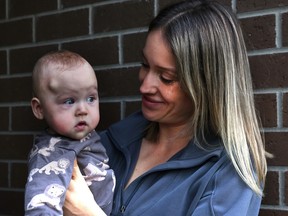Georgia Colborne was born in January at 25 weeks gestational age. She fought for her life over 110 days in the neonatal intensive care unit

Article content
A Vancouver mother is questioning B.C.’s respiratory syncytial virus (RSV) strategy after her baby, who was born premature, was denied access to a potentially lifesaving inoculation.
“It’s infuriating. We do everything we can to help keep our children safe, but the B.C. government is not providing what they need,” said Lauren Colborne, the mother of baby Georgia.
Advertisement 2
Article content
Georgia was born in January at 25 weeks and six days gestational age.
As she fought for her life over 110 days in the neonatal intensive care unit, her care team told Colborne that her baby would need, and be eligible for, the medication that could protect her from RSV, and that if Georgia contracted it, she could die.
RSV is highly contagious and can lead to severe outcomes. It is the number-one reason infants are admitted to hospital in Canada.
In advance of RSV season, which begins in November and runs through March, Georgia’s pediatrician wrote a supporting note, and applied for the shot, filling out the province’s questionnaire and submitted it to the Provincial Health Services Authority’s RSV program.
The province does not provide universal immunization for RSV, but uses a point system to determine eligibility.
“We were declined,” said Colborne. “Did B.C. not order enough? Do they not have enough to go around?”

In addition to pneumonia, bronchiolitis, asthma, and potential mortality, The Journal of Infectious Diseases reports that 40 per cent of RSV-positive children under the age of two experience acute encephalopathy and brain damage.
Article content
Advertisement 3
Article content
Health Canada has called nirsevimab, a long-lasting antibody that provides protection and reduces hospitalizations by over 80 per cent, the “preferred” immunization for RSV in children.
Ontario and Quebec rolled out programs this fall offering nirsevimab to all newborns.
B.C. offers an older monoclonal antibody, palivizumab, and only to high-risk infants on the basis of a medical risk probability score.
There is no question that Georgia is medically vulnerable — she was born extremely premature in January and weighed just one kilo.
Colborne was given no information about why her daughter was denied the inoculation, despite significant risk factors including chronic lung disease.
A few details from her application form have helped Colborne piece the puzzle together.
Georgia was off oxygen support at 15 weeks pre-RSV season, missing the automatic approval cutoff of 16 weeks.
Georgia was two points short of qualifying for the vaccine when her score was totalled up, but the one-size-fits-all score doesn’t include important individual risk factors.
Georgia won’t be attending daycare — an indicator that would have bumped her risk score up by 22 points — but she has an older sister.
Advertisement 4
Article content
Her sister must be kept home from activities for fear of bringing RSV into the house and infecting her baby sister, said Colborne.
Georgia’s father, a commercial pilot, is exposed to “thousands of people a week,” said Colborne. But that risk factor was not taken into consideration.
“We were in the (neonatal intensive care unit) for 110 days. She had eye scans, she had blood transfusions, she had brain scans, she had two holes in her heart, she was on full oxygen support until April. How sick of a baby do you need to be to get this vaccine?” asked Colborne.
“She should qualify for it,” said Fabiana Bacchini, who is executive-director of the Canadian Premature Babies Foundation.
“The long-term impact of RSV on our babies is well-known, but the long-term affect preemies is even more severe. It’s not a common cold.”
For parents who have gone through the experience of having a baby in the neonatal intensive care unit, seeing their child go back into hospital can be traumatic, said Bacchini.
In July, Georgia was hospitalized for eight days with rhinovirus — a minor common cold in most babies.
Advertisement 5
Article content
“If she gets RSV, we’ve been told by her doctors that it’s a very real possibility she will not survive it,” said Colborne.
Provincial Health Services and B.C. Children’s Hospital did not reply to Postmedia by deadline. The B.C. Ministry of Health simply said, “The (monoclonal antibodies) program is run through B.C. Children’s Hospital and is not delivered by B.C.’s publicly funded immunization program.”
Colborne has been frantically searching for access to the monoclonal antibody shot and is willing to pay for it, but she has not met with success. Canada’s medical system bars her from getting it in another province. Nor is she allowed to buy the vaccine in B.C.
Pregnant women in their third trimester are offered an RSV vaccine that extends protection to their fetus, but Colborne gave birth to Georgia before she could get the vaccine.
“She was born in the wrong province, at the wrong time,” said Colborne.
Recommended from Editorial
Bookmark our website and support our journalism: Don’t miss the news you need to know — add VancouverSun.com and TheProvince.com to your bookmarks and sign up for our newsletters here.
You can also support our journalism by becoming a digital subscriber. With a subscription, you’ll get unlimited access to The Vancouver Sun online, as well as the ePaper and our app. Support us by subscribing today: The Vancouver Sun.
Article content




Comments